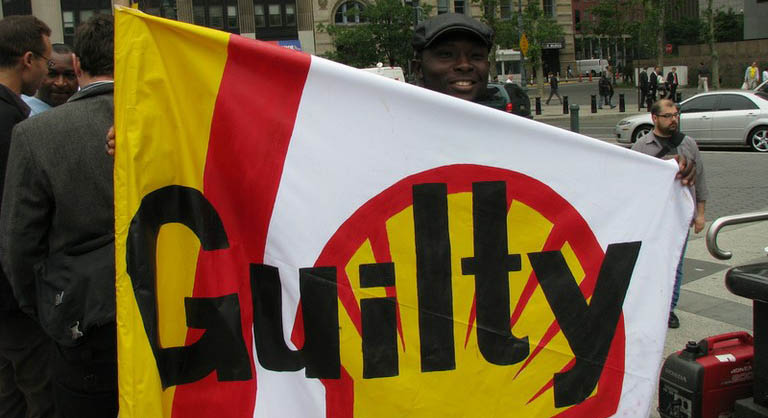January 31st 2007, Brussels, Amsterdam, London – A new report, launched the day before oil giant Shell announces its 2006 annual profits (1 February 2007) calls on Shell to use its profits to begin cleaning up damage it has caused to communities and the environment [1]. The report offers proposals and figures for where and how Shell should repair some of the damage it has caused in nine communities around the world.
The report is published by the Shell Accountability Campaign, a network of environmental, human rights and community groups, including Friends of the Earth. The coalition has analysed existing information and carried out new research to work out costs of cleaning up damage Shell has caused at specific locations in Nigeria, Russia, South Africa, Curacao, Brazil, the USA, the Philippines, Ireland and Barbados.
Adverts calling on Shell to use its profits to clean up its mess are also appearing in British newspaper The Guardian and Dutch newspaper de Volkskrant on 1 February. The adverts are signed and financially supported by more than 7.000 people from across the world through a dedicated website: www.shelladvert.org
Paul de Clerck, corporate campaigner at Friends of the Earth Europe said:
“Shell’s sky high profits in 2006 were at the expense of people and the environment across the globe. Shell’s CEO Jeroen van der Veer should accept responsibility for this and allocate money to clean up the mess.”
In Nigeria, a country devastated by the impacts of oil extraction, Shell should begin by immediately stopping illegal gas flaring at a cost of about 1.55 billion dollars. It should also start reserving money for clean up of oil spills and compensating the Ijaw communities, which will cost at least 11.5 billion dollars.
In Sakhalin Island, Russia, a Shell consortium is constructing a controversial oil platform and pipeline which threatens critically endangered whales, other wildlife and habitats as well as the local fishing industry. An initial cost of repairing environmental damage has been estimated at 376 million dollars.
In Durban, South Africa, local communities are calling on Shell to replace the old refinery and pipelines which would cost approximately 6 billion dollars. The existing ageing infrastructure means that accidents and leakages happen on a regular basis. The local community suffers from health problems due to air pollution.
In Ireland, where Shell is building a controversial on-shore gas refinery and high pressure gas pipeline in an unstable peat bog area and protected coastline, the company could choose to listen to the local community’s concerns and refine the gas at sea rather than on land. This reduction of damage and risk would cost Shell approximately
736 million dollars.
Friends of the Earth Europe is campaigning for legislation at an EU level to ensure that European companies are liable in Europe for environmental and social damage that they cause worldwide.
“History shows that European companies like Shell will trample over fragile areas of the world with no shame. The EU has a responsibility to stop this, by introducing legislation to make European companies accountable for damage caused in Europe and beyond,” Mr de Clerck added.
***
Notes
[1] The report “Use your profit to clean up your mess” is available from the above contacts and at:
http://www.foei.org/publications/pdfs/mdshellh.pdf






